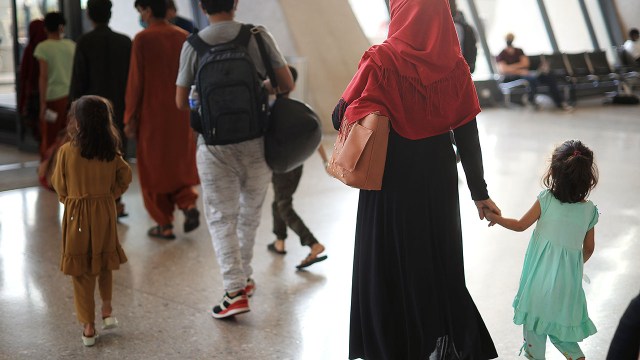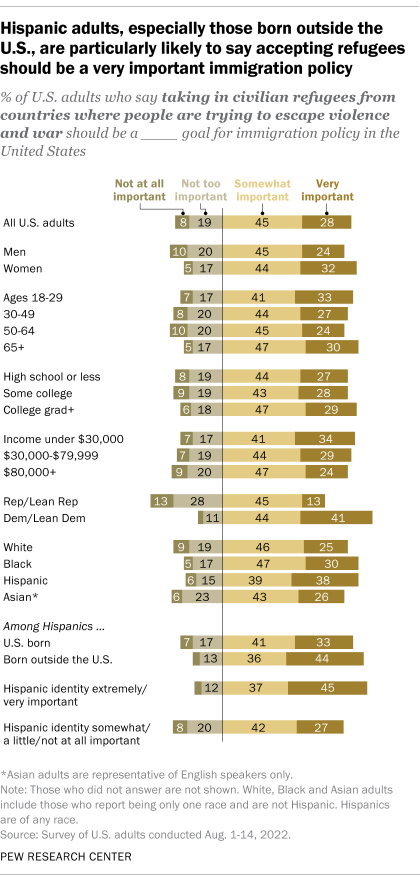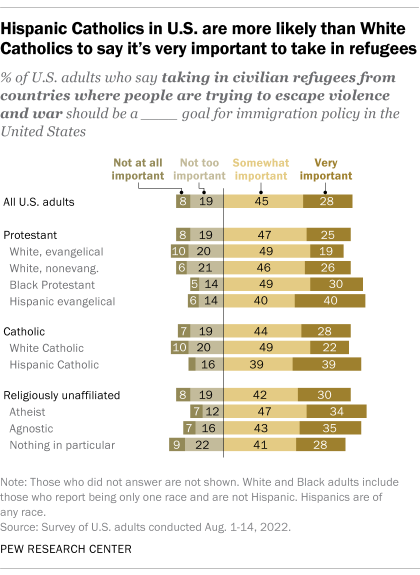
The Taliban takeover of Afghanistan, the war in Ukraine, violence and turmoil in Central America, and other conflicts around the world continue to force many people to cross international borders in search of safety and security.
Against this backdrop, around seven-in-ten Americans (72%) say taking in civilian refugees from countries where people are trying to escape violence and war should be a very or somewhat important goal for immigration policy in the United States. But only 28% say this should be a very important priority, according to a Pew Research Center survey conducted last month. And opinions on this question vary by party, race and ethnicity, and other factors.
(The survey did not define “refugee” for respondents, and the term can have specific legal meaning in certain contexts. For instance, while the United Nations has an official refugee program, some immigrants are granted asylum in the U.S. or receive protection from deportation under the Temporary Protected Status, or TPS, program. The U.S. recently made immigrants from Afghanistan and Ukraine eligible for TPS.)
This Pew Research Center analysis examines Americans’ views on the U.S. taking in civilian refugees trying to escape violence and war. The analysis relies primarily on a survey of 7,647 U.S. adults, conducted from Aug. 1-14, 2022. The survey was conducted on the Center’s nationally representative American Trends Panel, with an oversample of Hispanic adults from Ipsos’ KnowledgePanel.
White, Black and Asian adults include those who report being only one race and are not Hispanic. Hispanics are of any race.
Respondents on both panels are recruited through national, random sampling of residential addresses. This way nearly all U.S. adults have a chance of selection. The survey is weighted to be representative of the U.S. adult population by gender, race, ethnicity, partisan affiliation, education and other categories. Read more about the ATP’s methodology.
Here is the question used in this analysis, along with responses, and its methodology.

About four-in-ten Democrats and independents who lean toward the Democratic Party (41%) say taking in refugees should be a very important policy goal, but just 13% of Republicans and GOP leaners agree.
Partisan differences on this question generally are larger than demographic differences. But women are somewhat more likely than men to say that taking in refugees who are trying to escape violence should be a very important goal for the U.S. (32% vs. 24%). And Hispanic adults (38%) – just under half of whom are immigrants themselves – are more likely than White (25%), Black (30%) or Asian Americans (26%) to voice this opinion. (It is worth noting that Asian adults in the U.S. are even more likely than Hispanic adults to be immigrants: 71% vs. 45%.)
Indeed, Hispanics who were born outside the U.S. are more likely than U.S.-born Hispanics to say taking in civilian refugees should be a key U.S. policy goal (44% vs. 33%). Similarly, those who say their Hispanic identity is extremely or very important to how they think about themselves are much more likely to say this should be a very important policy goal than those who say their Hispanic identity is less important to them (45% vs. 27%).
Differences by education and income on this question are modest, although Americans whose household income is under $30,000 per year are somewhat more likely than others to say taking in refugees should be a very important goal for U.S. immigration policy.
Many religious leaders, including Pope Francis, have long advocated for compassion for migrants and refugees, with some Christians citing biblical teachings on the topic. But some Christian subgroups are more likely than others to say the U.S. should prioritize welcoming refugees.

For instance, Hispanic evangelicals, Black Protestants, and White nonevangelical Protestants all are more likely than White evangelical Protestants to say accepting refugees should be very important. This at least partly reflects the partisan composition of these religious groups, with White evangelicals much more likely to identify as Republicans than as Democrats.
Among U.S. Catholics, there also are differences by race and ethnicity: Hispanic Catholics are nearly twice as likely as White Catholics to say taking in refugees should be a very important policy goal for the U.S. (39% vs. 22%). This analysis does not look separately at members of non-Christian religions due to sample size limitations.
How Americans view accepting refugees from Afghanistan, Ukraine
In other recent surveys, the Center asked Americans about their views on accepting refugees from two countries: Afghanistan and Ukraine.
In a September 2021 survey conducted shortly after the U.S. military’s withdrawal from Afghanistan – and the Taliban’s subsequent takeover of the country – 56% of U.S. adults said they strongly or somewhat favored the U.S. admitting thousands of refugees from Afghanistan, while 42% strongly or somewhat opposed the idea.
There was greater public support in the U.S. for accepting refugees from Ukraine, according to a separate survey conducted in March 2022, just after the Russian invasion of Ukraine and the refugee crisis it created began. In that survey, 69% of U.S. adults said they strongly or somewhat favored admitting thousands of Ukrainian refugees into the U.S., while 29% opposed the idea.
In both surveys, Democrats were considerably more likely than Republicans to express support for the U.S. taking in thousands of refugees from each conflict zone.
